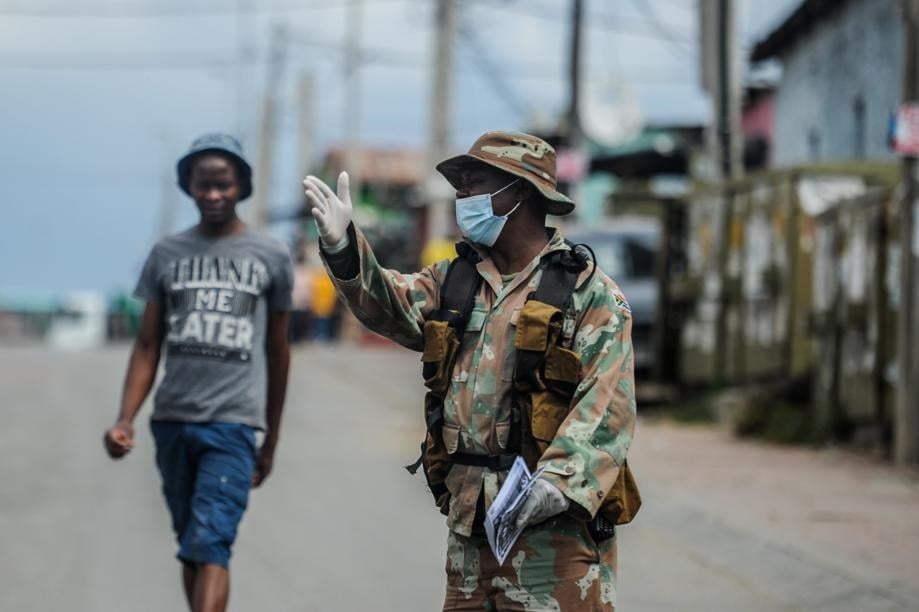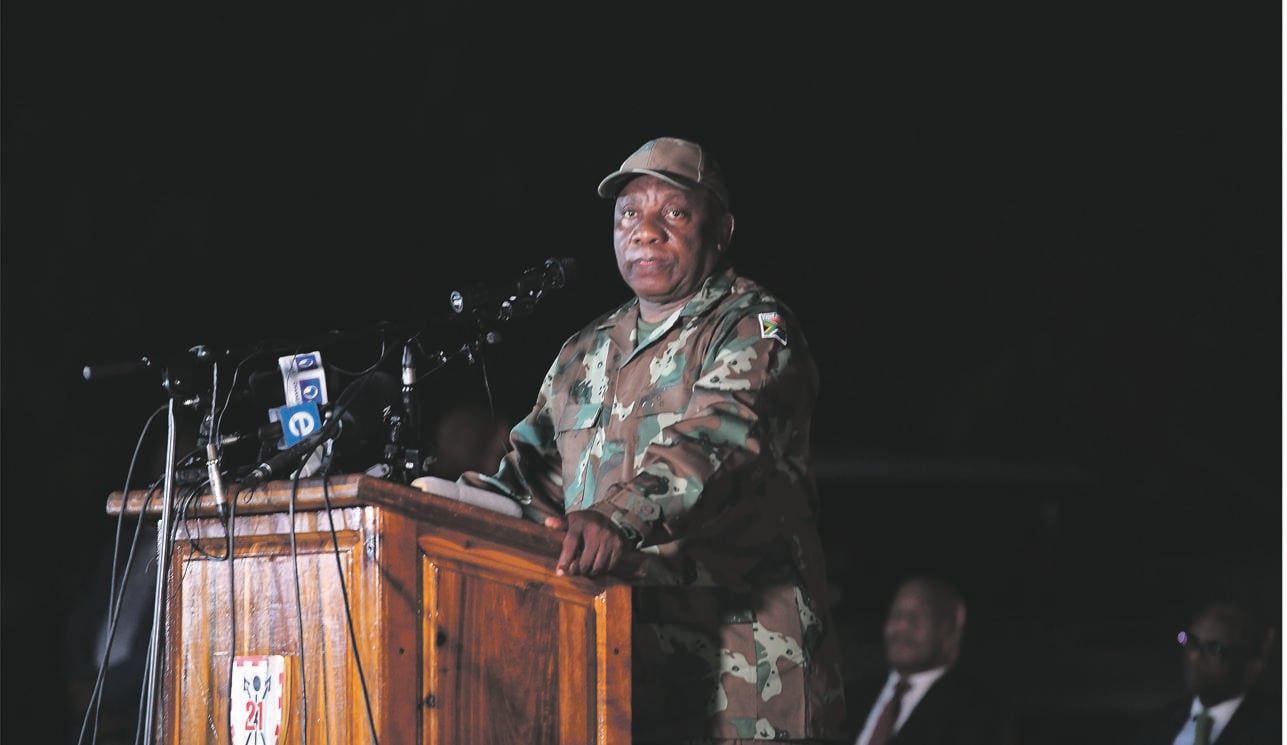
South Africa’s 21-day lockdown is a drastic measure intended to help and protect the public. For it to work, it needs an extraordinary level of trust, communication and clear messaging. It will have to be implemented with belief, commitment and engagement by the majority of our people, write Dr Lydia Cairncross and Kelly Gillespie.
During the first few days of the 21-day lockdown, we saw worrying scenes of police and army officers beating up and harassing citizens on the streets.
For some, this was reminiscent of the days of the state of emergency under apartheid.
The difference today is that this is a “stay at home” or 24-hour curfew implemented as a drastic health measure in the face of a global pandemic.
The lockdown is intended to help and protect us. However, there is broad non-compliance with the lockdown regulations in townships (and some suburbs). Our communities do not trust the state – police and military – enough to be persuaded that the lockdown is for the people’s benefit.
The use of brute force by some army and police officers will not succeed here.
For the lockdown to work it needs to be implemented with belief, commitment and engagement by the majority of our people. This includes people from informal settlements to middle-class communities, from the rural villages to corporate chief executives.
This lockdown needs an extraordinary level of trust, communication and clear messaging.
What role can civil society leaders and activists play?
We should try to build understanding, trust and collective commitment to the lockdown by using the full extent of our leadership, influence and networks to spread progressive, context-appropriate public health messaging.
Our role is also to highlight the contradictions and inequities unmasked by this epidemic and campaign for the protection of the unemployed, the working class and vulnerable groups from an explosion of disaster capitalism which seeks to exploit this crisis for profiteering.
We should also make the lockdown rules feasible, tangible and practical – particularly for the millions of South Africans who live in overcrowded townships and informal settlements.
Without an acknowledgement of how vastly different the lockdown is in these communities to the suburbs, we can only expect resistance and non-adherence. We need to address the deep sense of cynicism people have when hearing about isolation and physical distancing. This cynicism is understandable.
It is a difficult matter to stay at home when you are living in a one-bedroom house or shack with many people sharing a tiny living and sleeping space.
Only by empowering communities with information about why the lockdown is necessary and how it can be done in their own living context, can we expect a mass endorsement and promotion of these restrictions.
How we can do physical distancing in SA
As the People’s Health Movement of SA (PHMSA) we believe that part of the uncertainty about the lockdown and physical distancing is the impossibility of keeping the distance from other people when living in small crowded spaces.
We therefore need to clarify that physical distancing is keeping out of physical contact with people who are not in your household or family.
And “household” and “family” are varied in South Africa with many people not living in nuclear families or where who lives in your home is often changing due to migrant labour, different definitions of a family, shared accommodation and subletting.
In light of this, each of us needs to define who and where our “household” is for this time of the lockdown and physical distancing. We suggest that these are the people you usually live in close proximity to, in the same dwelling, sharing meals and sleeping areas.
During the lockdown these become the people with whom you remain close. We can continue to eat meals together, cuddle our children, hold and hug our close and loved ones.
What we cannot do is extend this level of physical contact to people outside our household. This means mostly staying indoors or having outside time in an area that is part of your home and not a public space. Outside time will mean vastly different things for different people.
For the middle class, it may mean you stay in your house and can sit or walk in your garden. For people living in smaller homes in the townships and dense urban areas, this may mean identifying the few metres outside your home – fenced or not – that you mark as the outside space of your “household”.
For those in living in flats, it may mean identifying clear boundaries between balconies and remaining at a distance from other household members. Or drawing up a roster to take turns to use a shared courtyard or garden.
What is really important is not to have physical interaction with people outside of your household. This means no visiting neighbours, checking in on a cousin in the township or suburb close by and not stopping in groups to chat when out to shop for essential items.
What about going out for necessary supplies? Once we have settled in our households, we should not go outside unless there is an emergency. One person from the household should be chosen to get food and essential supplies but that should be done as infrequently as possible.
We should aim for once a week or less – as each time someone leaves the home, they risk bringing the virus back.
When it is necessary to make this trip to purchase essential groceries, medication or to a health facility for treatment, this person should take great care to protect those in their household.
This can be done by not interacting closely with other people – keep a distance of 1.5m – washing hands at every opportunity, not touching their face and using the sanitiser provided at public spaces. When you return, it is essential to protect those at home by washing hands thoroughly before touching anyone and if possible, changing outside clothes and washing them.
If these precautions are taken, once home we should again feel free to be close to the people inside our households. We all need contact at this time, to hug each other and take care of each other.
How we can do isolation in SA
The PHMSA agrees and supports the announcement on Monday by President Cyril Ramaphosa to roll-out mass testing, contact tracing and isolation. However, for many in South Africa, self-isolation in a separate room with a bathroom which can allow the 3m recommended distance, is simply impossible.
It is critical that government provides adequate, safe and well provisioned accommodation with separate bathroom facilities, food and supplies for our people in these circumstances.
We believe that we should consider these places health sanctuaries where people can recover from the virus, decrease the risk of spreading it and protect their families and loved ones.
Our cities have ample accommodation spaces to set up such sanctuaries, including currently empty conference centres, hotels and student hostels. There is sufficient goodwill and solidarity in our society for us to prepare these unused spaces for dignified accommodation of people who need to be apart from their loved ones during this time.
In the UK, people older than 70 have been asked to self-isolate at home as they are at high risk of severe Covid-19 infection. While this is largely not feasible in South Africa, we should also consider making available coronavirus-free health sanctuaries for the elderly or those with significant underlying medical conditions who live in crowded living conditions for the same reason.
As activists and civil society leaders, we should lead in our individual communities to make the lockdown liveable for others. This could mean identifying community members who need assistance. These include the elderly who need help with grocery shopping or those with illnesses who need to access medication or visit clinics.
These actions should be done safely, using virtual communication where possible and maintaining safe physical distance at all times.
Army and police should bring a spirit of support
The lockdown assumes that state emergency services will do everything but they cannot possibly achieve this. Government needs civil society to assist with this lockdown. And known community leaders including social, sporting, political and religious, should be recognised and brought into the response teams for implementation and assistance.
South Africa has a rich tradition of grassroots mobilisation which needs to be tapped into during this time. There are many well-intentioned young people and other leaders who would play a positive role if supported and shown how to be safe in their actions. This could serve as a valid and critical extension of government’s attempt to make the lockdown work.
We therefore call on the army and police to bring a spirit of support and service to their necessary duties of promoting compliance with the lockdown restrictions. Importantly, the lockdown implementation by government must come together with the provision of much-needed food, water and health assistance. These are essential to make it possible for communities to survive the lockdown.
The army and police should also support and partner with community leaders while maintaining a visible presence as opposed to only using fear and intimidation.
This different approach is essential to promote long-term adherence to the lockdown regulations and help build the critical levels of trust in government interventions which will be needed in the weeks and months ahead.
If we can broadcast an empathetic and practical approach to the lockdown in communities where water, food and sanitation are scarce and overcrowding is a daily reality, we may build the necessary community understanding, support and implementation.
This can take the lockdown from one that needs the army and police in the streets to enforce it, to one where we, the people, make it happen through our creativity, our willpower and our collective belief that this is the best way to go for all of us in this uncertain time.
*Cairncross and Gillespie are both members of the People’s Health Movement SA.
**This article was first published inSpotlight – health journalism in the public interest
 | ||||||||||||||||||||||||||
Get in touchCity Press | ||||||||||||||||||||||||||
| ||||||||||||||||||||||||||
| Rise above the clutter | Choose your news | City Press in your inbox | ||||||||||||||||||||||||||
| City Press is an agenda-setting South African news brand that publishes across platforms. Its flagship print edition is distributed on a Sunday. |




 Publications
Publications
 Partners
Partners









